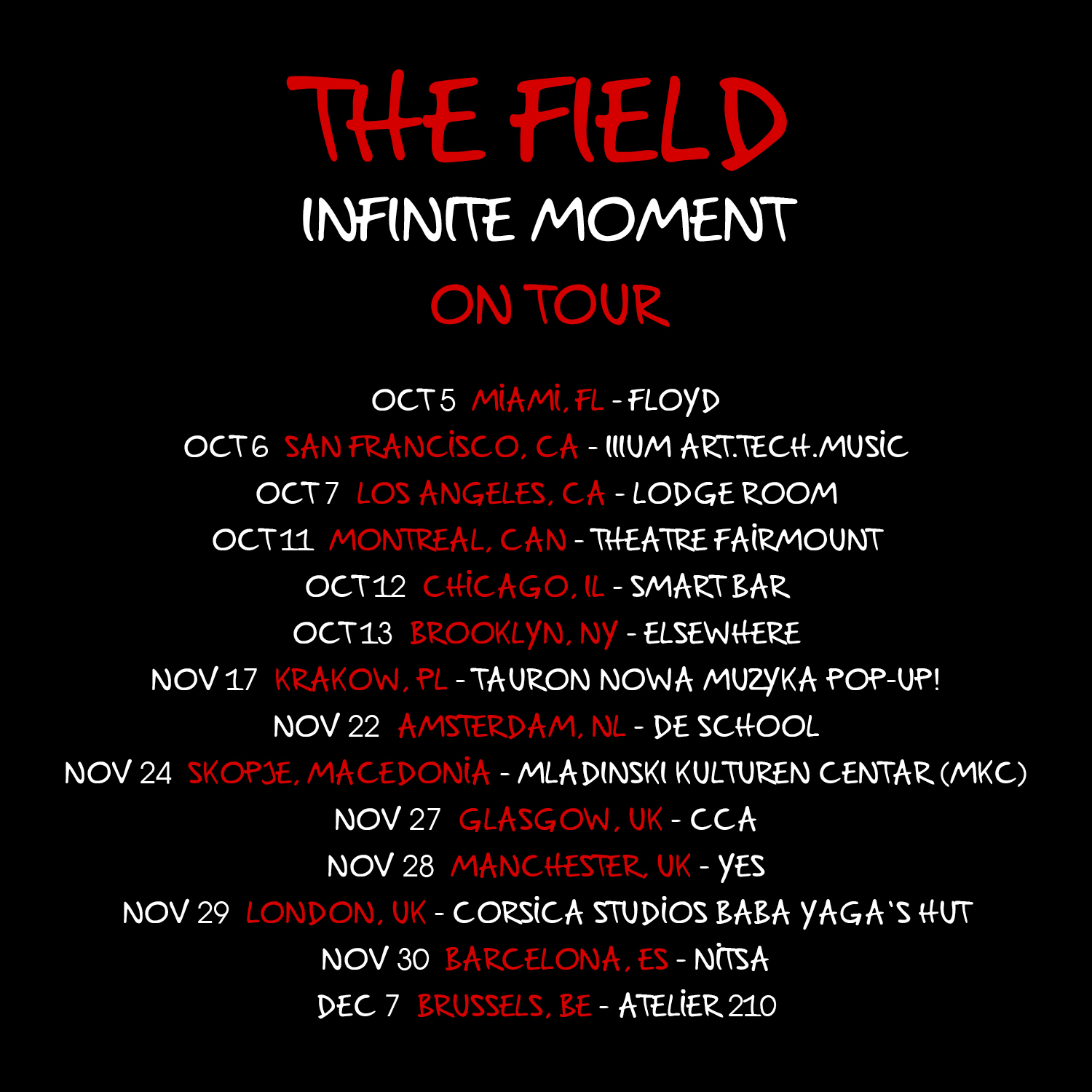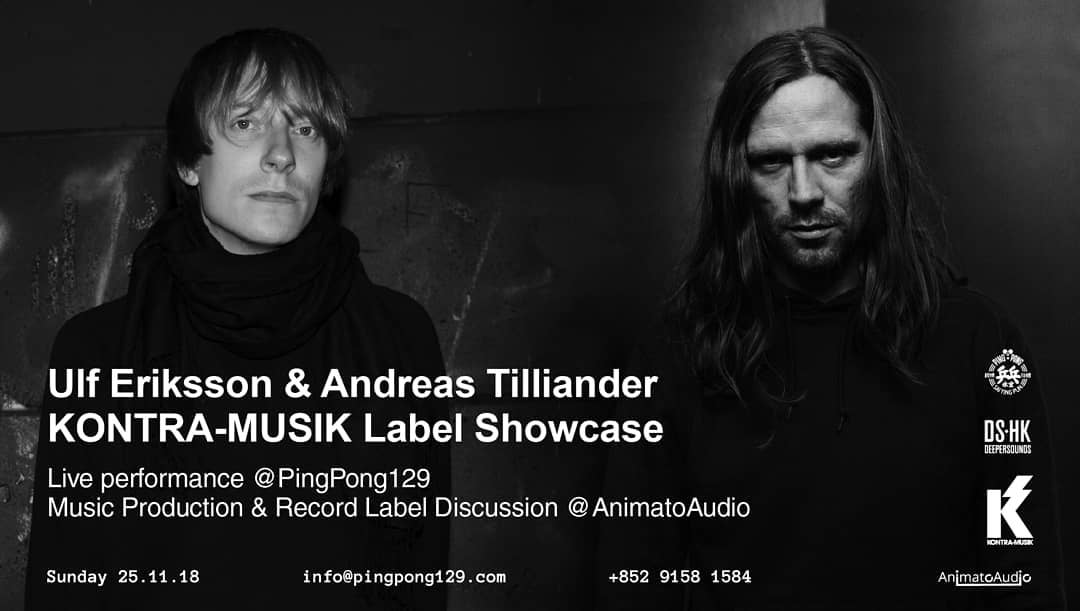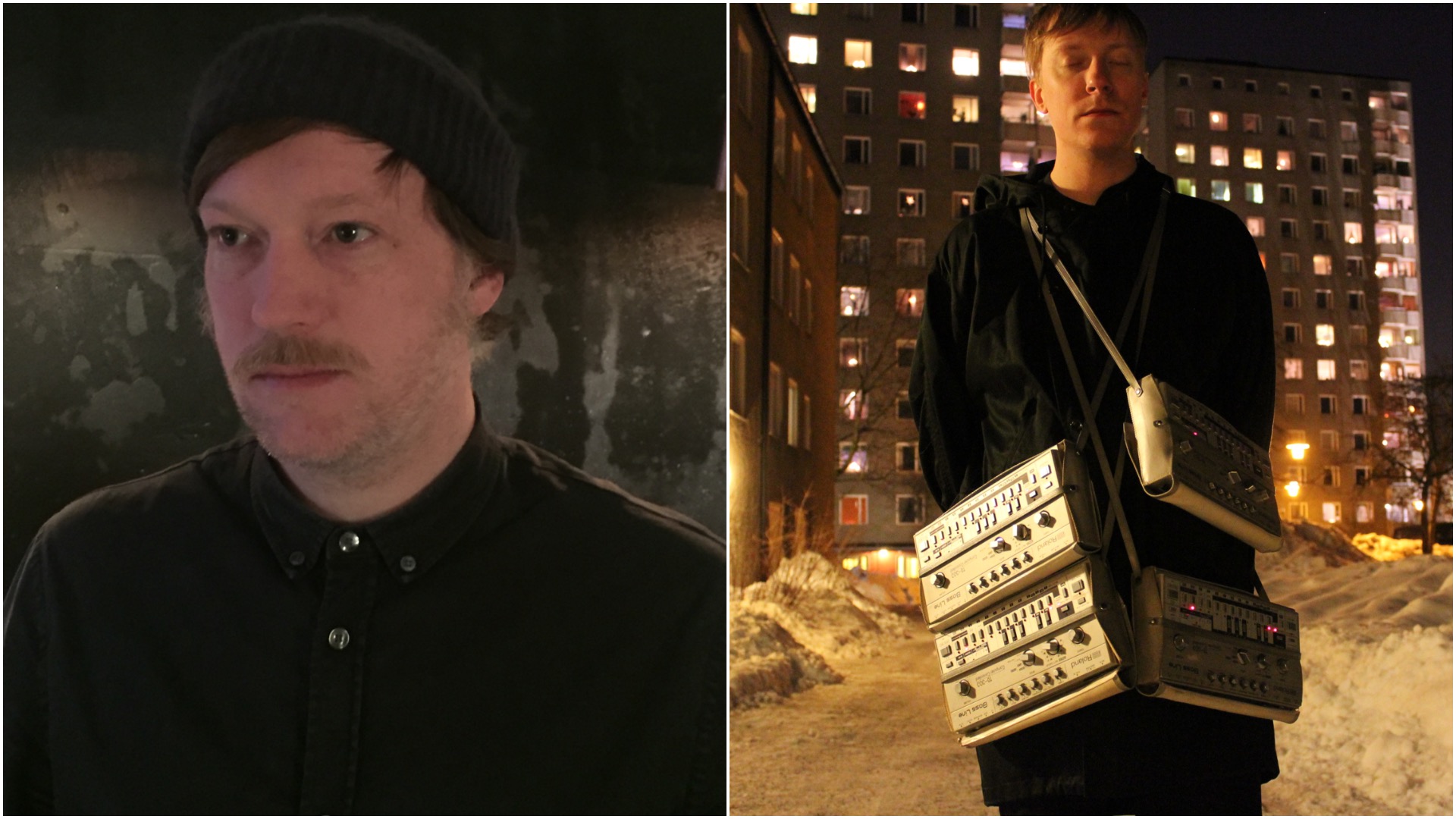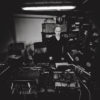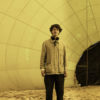Axel Willner and Andreas Tilliander both have a complicated relationship with Stockholm. While the former moved to Berlin on a whim about a decade ago, the latter’s stuck around but often feels out of place or misunderstood in his longtime home.
“For a while there,” explains Tilliander, “I got booked at these indie nights, where someone would play The Smiths and The Cure for an hour, then I’d play techno and everyone hated it. Nowadays, people don’t really book me in Sweden, so it all worked out [laughs].”
The producer is only half-kidding of course. Thanks to his many aliases (TM404, Mokira, Rechord, Lowfour), deeply underground label (Repeatle), and live role in the popular Swedish act Familjen, no one quite knows what to make of the Hässleholm native here. Not that he minds when folks like Richie Hawtin often tap him for experimental techno shows elsewhere.
Meanwhile, Willner rarely plays in Stockholm anymore, but is now internationally known for his blissful ambient outlet The Field. Not to mention such palette-expanding cult favorites as Hands, Lars Blek, Loops of Your Heart, and Cordouan. The only thing missing in his ouevree is a proper duo project with Tilliander, a longtime friend that came up in the same underground scene nearly 20 years ago.
In the following Skype exchange, we discuss everything from Stockholm’s most seminal underground club to the one time the pair actually played together….
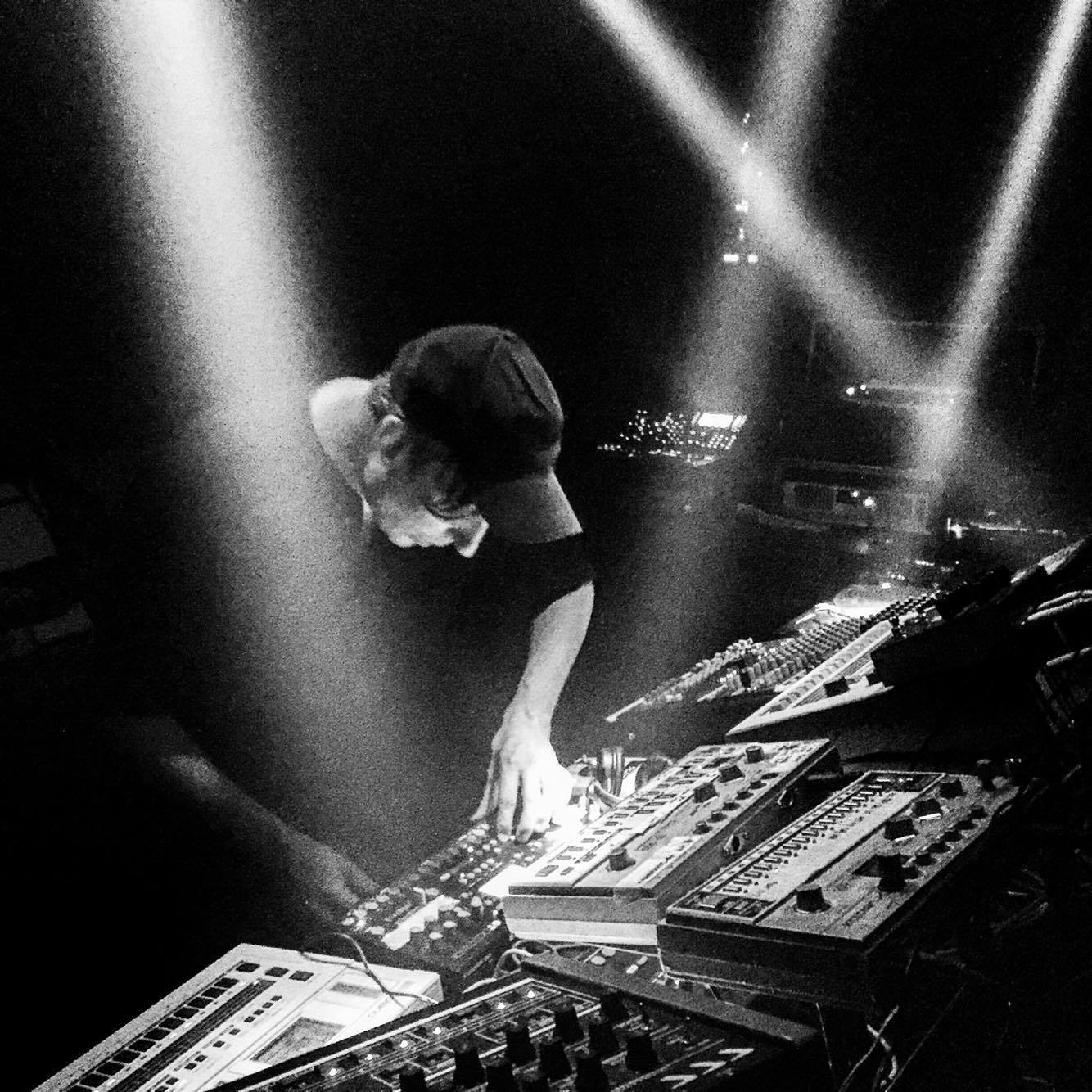
What are your earliest memories of really connecting with a certain record or artist on a deeper level?
Andreas Tilliander: I was always into electronic music, ever since I was like 10. My first records were probably Depeche Mode, Kraftwerk, and D.A.F. For a while, I was actually singing in a band. A week ago actually marked 25 years since I’d been on stage for the first time. That was an awful experience because I didn’t know about techno or ambient music at the time. I grew up in a really tiny city, so anyone who was remotely into electronic music was just into Depeche Mode.
When I discovered Aphex Twin’s On CD in 1993, it really changed my life. It helped me understand you could actually make music without singing. Which was great because I was a terrible singer.
Was your band like Depeche Mode then?
Andreas: Yeah, it was basically a synth-pop band, and then we got into harder stuff like Front 242 and Nitzer Ebb.
Did you put out a couple records?
Andreas: We participated on some compilations of Scandinavian electronic music in the mid ’90s. Some of it was okay, but most of it was really terrible.
You didn’t get a chance to play keyboards or anything; you were just singing?
Andreas: No, no, no; I did everything. I was the guy with the synths, and I did the production.
But the singing part was always awkward?
Andreas: Absolutely. I’m never going to sing again.
Your background is a little different, isn’t it, Axel? Weren’t you into punk music first?
Axel Willner: Totally. I came from the completely opposite side, I guess. I was really into punk from an early age and played in a lot of bands. I did a little singing, too.
Andreas: In The Devils?
Axel: No, that was much later. This was when I was 12 or 13. I did that for a long time and was really into it. My love of electronic music started with Daft Punk’s Homework album. It made me want to do something like that myself, so I recorded some stuff with my friend, Ola [Keijer].
Was that Speedwax then?
Axel: Yeah, Speedwax never really happened, though; we thought there would be an album, but we just ended up playing around Stockholm a bit. And eventually we started to work on our own [solo] music.
Why did Homework appeal to you?
Axel: The video for “Da Funk.” was really exciting and cool; I’d never really heard anything like it before. It was really intriguing.
Before that, were you one of those kids who refused to listen to anything but punk?
Axel: Of course, but I don’t blame punk for that; I blame teenagers, and the need to belong somewhere. I remember I liked “Little Fluffy Clouds,” too, but I couldn’t really say I did.
What would be the closest comparison to the kind of punk you played?
Axel: The one Andreas mentioned, The Devils, was kind of like The Hellacopters—garage-y punk rock.
And neither of you were into Swedish metal, even though that was really popular in the ’90s?
Axel: No, not really, but black-metal bled into the punk scene a bit. Kids would meet and talk about who shot who, or who ate whoever’s brain—all these half-truths.
Andreas: I guess it was the same for me. Some aspects of the black-metal scene were intriguing to me. I actually remember sitting in Axel’s apartment in the early 2000s and listening to Burzum for the first time.
What drew you towards Burzum—the atmospheric side of what he does?
Axel: For me, it became a nostalgic thing later on. I was never super into it, but I found the scene exciting and special, like a horror movie. There was a lot of shit going on, a lot of rumors. And you didn’t know what was true, and what was not.
Well a lot of it was heresay right? It’s not like you’d see a Facebook Live video of someone burning a church or whatever.
Axel: Exactly. And I used to love the [mythology] of metal as a kid. I really believed [Glenn] Danzig had kids buried in his garden.
A lot of people romanticize that period as being the most extreme. In fact, there’s even a new movie about it. What was it like for someone who actually grew up around it, though?
Axel: I remember hearing about all of the stabbings and church burnings, or Varg Vikernes killing Euronymous. It was all over the news.
Why did each of you eventually gravitate towards making ambient music?
Andreas: It really goes back to me realizing I didn’t have to sing. Not really being into techno at the time—in the mid ’90s—I was copying stuff like Selected Ambient Works instead. Then I went to an art school when I was 16 or so, and they told us about Brian Eno. We used to paint while listening to him, and I got more into ambient music from there.
Axel: [Hearing] GAS made the biggest impression on me. It still does in so many different ways.
You must have not minded people making that comparison, then, when you started releasing music as The Field.
Axel: Yeah, I was flattered to say the least.
Andreas: People have always compared my music to Basic Channel. And it doesn’t bother me, either, because it’s still one of my main influences. I remember in the early 2000s, Axel and I were trading records. He gave me a Rhythm & Sound 12-inch I didn’t have, and I gave him a GAS 12-inch. That time period really defines us. I like the dubby side of things, and Axel is on more of the ambient side, although I don’t really like separating the two. I think dub music can be ambient and vice versa.
Do you remember what songs were on those 12-inches?
Andreas: I don’t remember what the Rhythm & Sound one was, but the GAS record was Oktember.
Axel: We’re getting old and forgetting.
Andreas: Finally.
Axel: Yeah, finally getting old [laughs].
How did you guys first meet? Was it through Ola?
Andreas: I guess the story is I had one job, ever. It was at a music company in Sweden, around 1999 or 2000. We were selling MP3s, and I was responsible for signing and writing about the artists. You could also upload tracks the way you could on MP3.com at the time. One day I got music from this duo called Speedwax. Most of the other tracks were indie rock because Stockholm’s always been all about indie rock, so hearing Speedwax made me really happy. I needed to contact the guys, so we started to talk about the instruments we had and the ways we make music.
Was all of the music on that site Swedish then?
Andreas: We also had some Finnish tango and other strange things in our catalog, but it didn’t go that well. I worked there for about a year, and then I never worked for anyone again. I remember coming back from my first tour of Japan in 2001, and they said the last 30 employees were getting sacked. Record companies were starting to get into trouble then, what with the whole Napster thing. So anyway, I got back after being in Tokyo for two weeks and was really happy. I had just bought a bunch of Spacemen 3 and My Bloody Valentine rarities for a lot of money, but then it was like, ‘Oh, by the way, you don’t have a job anymore.’ But I had just been signed to Mille Plateaux and Force Inc., so they gave me an advance for making my first record.
Axel: Ooh!
Andreas: [Laughs] The company gave me two months [of severance pay], too, so I spent those two months making music. I thought that was great—that I could make music for two months, then get another job. But I never did.
Were you guys in the minority in Stockholm in terms of your tastes? How small was the scene itself?
Axel: It was pretty small, right Andreas?
Andreas: Yeah, there weren’t too many people. There was a lot of techno music though—people like Adam Beyer and Cari Lekebusch. Which I like nowadays, but I wasn’t really that impressed at the time. I wanted [electronic music] to be more experimental or laid-back instead.
Axel: There were certain record shops where people hung out, and the venue Fylkingen, where we helped with certain nights.
Wasn’t that where you guys really got to know each other?
Axel: Yeah, Fylkingen was really nice. It’s been around forever in Stockholm—since the ’50s, right Andreas?
Andreas: It might have even been the ’40s.
Axel: So yeah, it was an old, cool place. And there was this newer venue called the Nursery; I remember seeing Kid606 there. And Pole.
Andreas: Zoviet France also played at one point. Before that, it was on the sound art side of things, which I also love. Axel and I were in our early twenties, wearing Adidas sweaters and having long hair. For a while, a lot of great bookings were happening there. Not just when we played, of course.
Axel: [Laughs] It was cool; everything around Nursery felt like a little scene.
What was a show each of you saw there that made you really want to push yourself as a musician?
Andreas: Probably Pole, for me. I really enjoyed that people were dancing in this establishment for the first time. Even more fun was the fact that there wasn’t a kick drum or anything. People were dancing to his melodic basslines, which were so so good. That was a really great concert.
Axel: I agree. Thomas Brinkmann was also good back in the day.
Andreas: Here are some pictures of how we looked back then….
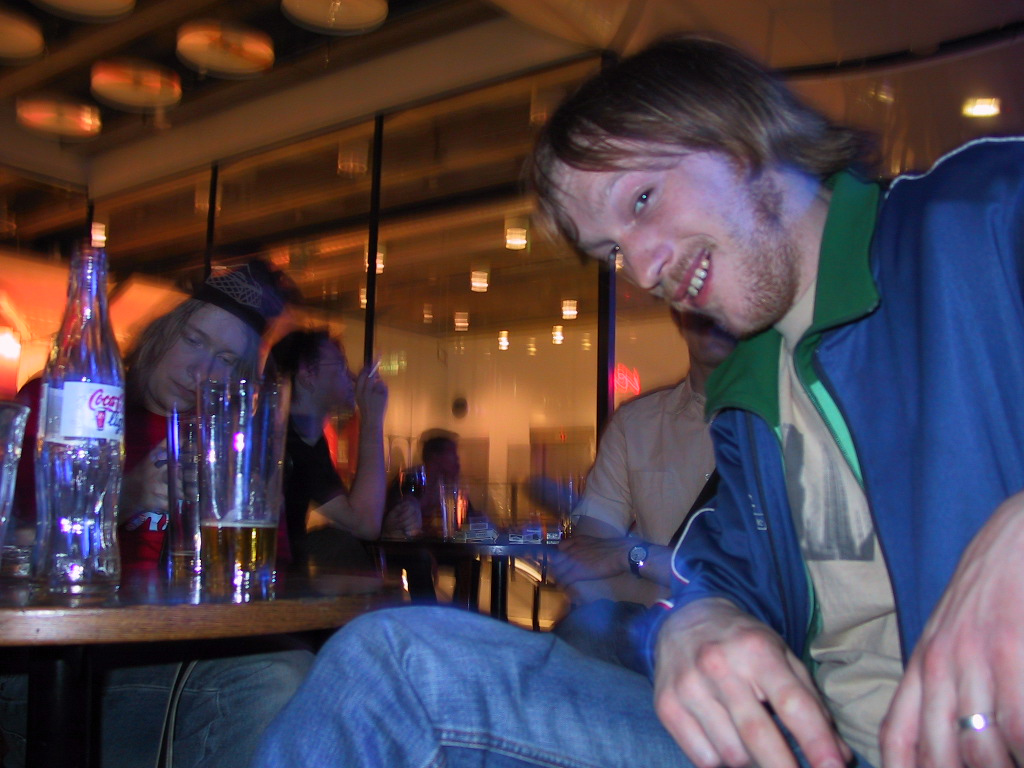
Very nice! You just had these on your computer?
Andreas: I was actually looking for photos from two performances we did together. It was some guitar music with ambient pads in 2001 or so. Theres’ nice pictures of us holding guitars—the only pictures of me ever holding a guitar, actually.I can use glitchy effects or whatever, but Axel can actually play.
You never really talked about recording together?
Axel: We didn’t, I guess.
Andreas: We’ve done remixes of each other’s work, but that’s it.
How did that scene evolve since the early 2000s, then? I guess that was the peak of glitchy music and IDM.
Axel: Yeah, all of that fit into the Nursery. It was a mix there. Then they started booking industrial and post-rock acts. Eventually, the Nursery disappeared, but then there was suddenly electronic music everywhere. I guess it was like the rest of the world; electronic music had this huge boom, new clubs opened, and more people got involved, which was fun to see.
Andreas: The reason why the Nursery stopped happening around 2002 or so is one of the founders moved to Berlin, and the other guy moved to Gothenburg. So the Stockholm scene was really boring for a while. Around the same time, I got my first break with Mille Plateaux and some commercial gigs like music for a bank or whatever. Glitchy stuff was really a thing in the early 2000s. It was all ‘laptop music’ back then, and really exotic. I remember the first time I saw someone perform with a laptop. I was like, ‘Fuck, this is so great!’ Nowadays, everyone is using a laptop, even rock bands.
Have each of you struggled with whether you feel comfortable performing with a laptop over the years? Like with you, Axel, I remember you were performing as a band with The Field at one point.
Axel: When I started The Field, everything was done with computers at first. When I first started performing live, I didn’t feel comfortable with the laptop at all. Eventually, the computer got replaced with a drum machine, MPC and humans.
Did it just feel like everyone was staring at you in front of a computer?
Axel: Yeah. I remember I was opening for !!! at the Avalon in LA, and the computer was still booting when I got on the stage. It only took about three minutes, but it felt like an eternity. That was really uncomfortable.
Has your setup changed a lot over the years, too, Andreas?
Andreas: I was just thinking about this the other day: that I haven’t used a computer onstage since, like, 2004. Around that time, I stopped doing the glitchy, strange music, and got more into techno again. So I didn’t need a computer anymore. I started touring with two MPCs, and I hadn’t used a laptop onstage again until about two weeks ago. I had to play a three-hour set in front of a few thousand people, so I put the laptop behind a bag, where no one could see it.
Axel: That’s pretty classic!
Andreas: Yeah, I put my 303s in front, too, so that’d be all anyone could see…. I’m also part of a pop band. I’m not responsible for making the tunes, but I’m responsible for performing them with the singer live. We’ve been touring a lot for the past 12 years. At one point, we did like 100 shows in one year. So back in Sweden, everyone related me back to that project—more like ’90s house with vocals.
Is that Familjen?
Exactly. We were on [hiatus] for about three years, but we got back to doing gigs again this year.
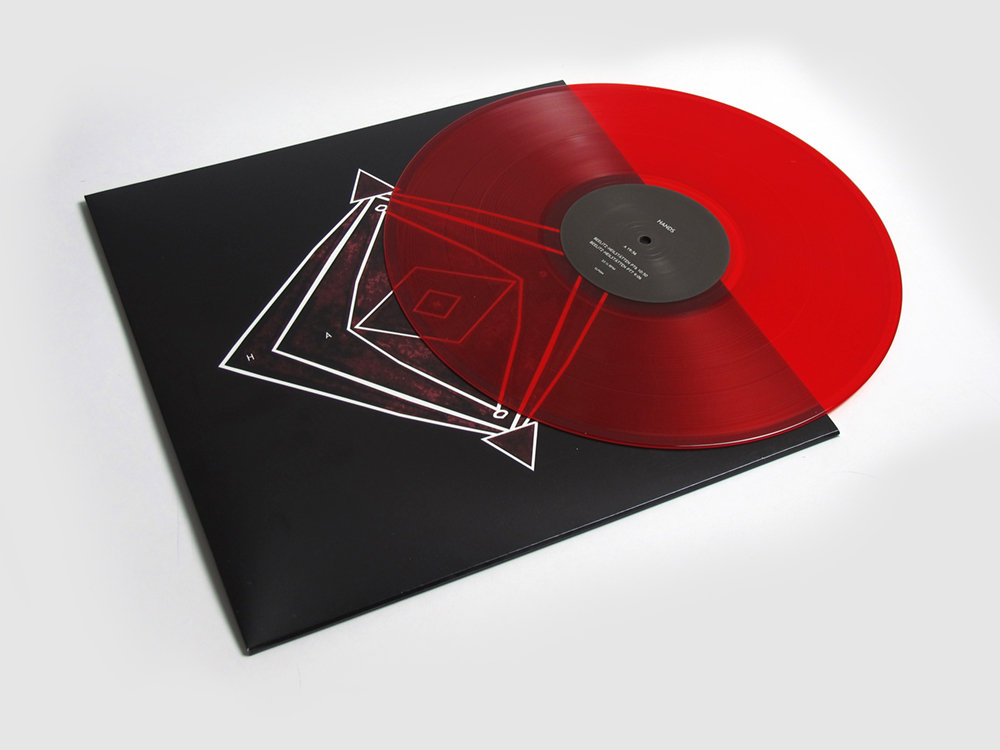
What’s one project each of you are proud of, but not many people heard?
Axel: For me, Hands. I really enjoyed doing it, but it’s quite unknown and there were copyright issues with the name, so it never really happened.
Why that project in particular? Because it was a different sound for you?
Axel: Yeah, and a lot of personal stuff was going on at that time, so it was really comforting in a way.
Well it was a darker record for you.
Axel: Yeah, it’s quite gloomy, to say the least—very drone-y.
Aren’t the songs named after an old hospital?
Axel: Yeah. Even Hitler was treated there. It’s falling apart now, as it hasn’t been in use since the unification of East and West [Germany].
You’re in a better spot personally now, then? We don’t have to worry about you?
Axel: No, no, no. It wasn’t a bad spot—just facing a lot of questions about life.
Would you like to make other music like Hands under a different name?
Axel: I’d have to. I definitely want to continue doing that kind of sound.
What about you, Andreas?
Andreas: Most people have known me as TM404 over the past five years. I don’t really care about Mokira that much nowadays. Apart from that, I put out three records on vinyl under my own name in 2007. They were slow, acid-y stuff, and Axel did one of the remixes. At the time, I thought I’d do an all-vinyl label, which meant that no one actually heard the records. But that was really my fault for saying, ‘Yeah, no marketing, no digital, no promotion.’ More like ‘no sales’ [laughs]. The song “Bonnadub” sounds like the start of TM404, though.
You wouldn’t recommend starting an all-vinyl label then?
Andreas: Richie [Hawtin] did that last year, where the records were only available through Hardwax. It sort of worked out better for him, though; I don’t know why.
What’s some old music of yours that’s worth hunting down?
Andreas: There’s some from when I was 16 that’s okay. I made a lot of shitty music after those tracks, though—from about 1994 to 2000. It took me a few years to find my sound.
Around 2004, I got into doing house-y techno with vocals, because I was really inspired by [Vladislav Delay’s] Luomo stuff. That got a little bit of hype and made me popular in Sweden, but it was probably my biggest mistake because some people only know that record and don’t care about what I’m doing now.
Do you ever think about leaving Sweden like Axel did?
Andreas: Well I’m 40 now, so I probably should have moved 20 years ago, when I started releasing music on German labels. Nowadays, I don’t feel like Berlin needs another dude playing techno music.
Axel: There’s a lot of them here.
Andreas: Yeah, it’s almost a joke. Whether you’re in a cafe or eating falafel, you’ll probably run into someone who’s a techno DJ. I guess it’s a bit overcrowded, but I’d love to live in Japan or Taipei. The only problem is I’d still have to go to Europe to perform and that’s not really good for the environment or anything else. I guess Stockholm is okay. It’s super expensive compared to some other cities, but it’s still a nice place.
Axel: It is.
Andreas: I think Axel was my first friend after I moved to Stockholm. And I didn’t really have the urge to move when he did, because the city still felt new to me then.
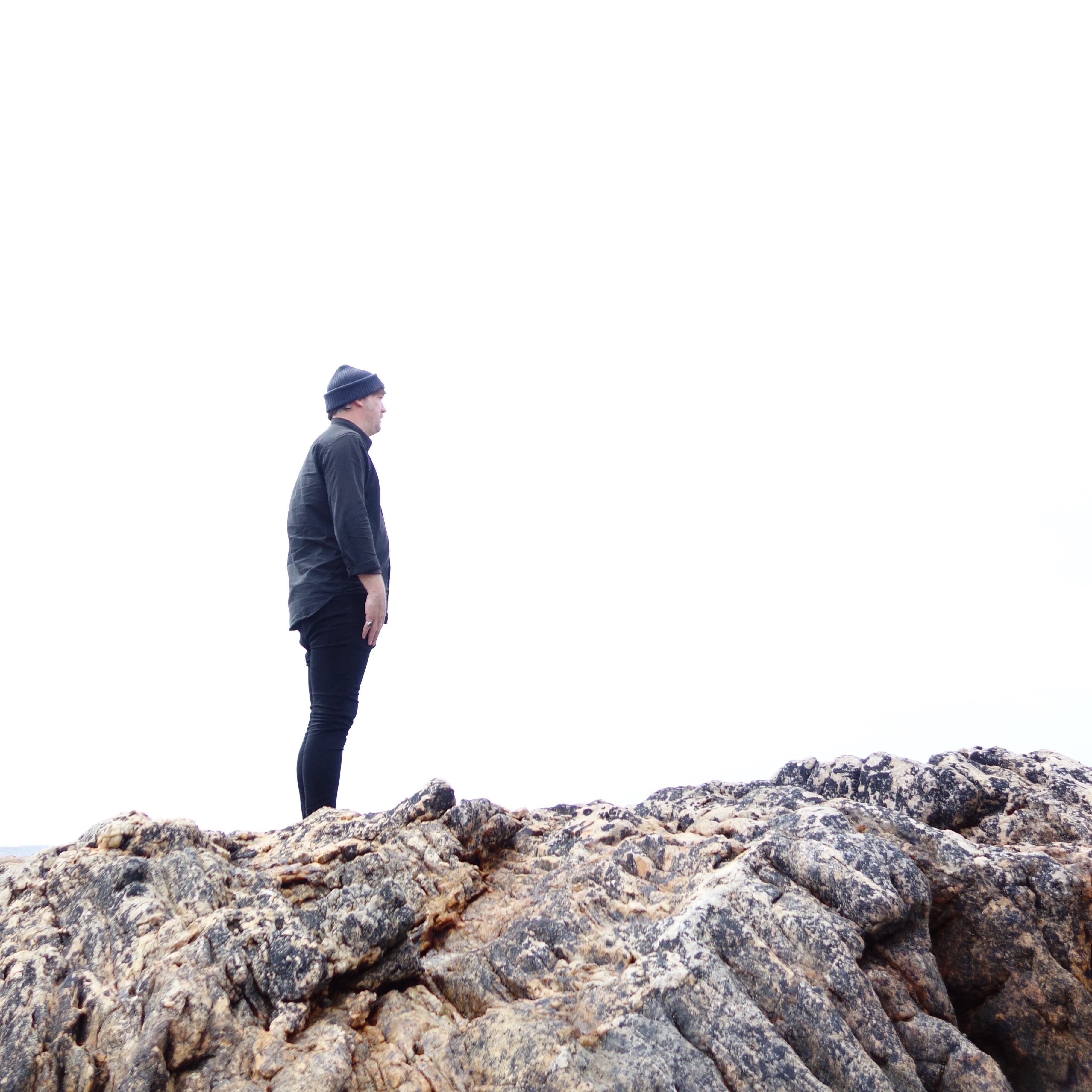
Did you grew up dreaming of leaving Stockholm, Axel? Whereas Andreas maybe dreamt of moving to it because he’s from a smaller town?
Andreas: I did.
Axel: I also grew up partly in Lisbon; if you’ve lived somewhere else, it’s easier to pick up and move again. Berlin just kind of happened, because it felt like I had nothing else holding me back.
And you’ve been there for about 10 years now?
Axel: Yes.
How do you feel about how it’s changed?
Axel: Well, I was just in New York and it felt pretty mellow compared to Berlin. It’s so crowded here; it’s getting nuts. One of the things I liked about it in the beginning was how empty and spacious it was. But it’s still a fantastic place to be. I really enjoy it.
Can each of you tell me about your favorite record by the other person?
Axel: For me, it’s Lowfour. What was the name of that EP?
Andreas: I think it was Repeatle, which is the same name as my label and studio.
Why that one?
Axel: It’s everything I enjoy—just really beautiful, with pads and a 4/4 beat. It’s almost like an uptempo ambient record.
Andreas: Right, almost like GAS or your stuff. A YouTube commenter said it sounds like Thomas Fehlmann, although his [Lowflow] record came out a few years later.
Axel: I have to tell him that tomorrow.
Andreas: You’re meeting him tomorrow?
Axel: Yeah, we’re playing Japan together.
Andreas: Nice; I’ve always been a fan of his. For me, I think Axel’s new record (Infinite Moment) is the best Field album, but I’ve always been a bigger fan of his Cordouan and Lars Blek projects.
What’s the back story of Cordouan?
Axel: I started a CD-R label (Garmonbozia Productions) around 2002 and Cordouan was very influenced by Stars of the Lid—ambient and drone-y.
Andreas: It’s exactly the kind of music I like: really sparse and dreamy. I like most of the stuff on Garmonbozia, actually.
Do you think you’ll ever reissue that stuff, Axel?
Axel: I’ve actually been thinking about doing what Andreas did before, but with some promotion: a proper vinyl label. I just need a boost to do it, so I’ve been talking to other labels I know, like Magazine and Ecstatic. I actually did two Lars Blek tracks not too long ago, which was really funny and satisfying. But I haven’t gone back to it again. So we’ll see what happens.
Well it feels like the ambient stuff both of you do is especially relevant now, as everyone is looking for a way to unwind lately.
Axel: It’s exactly the same here in Europe, unfortunately.
You guys mentioned feeling like outsiders in Stockholm before. Is there an underground artist you’d recommend from there that not a lot of people know about?
Axel: One I like a lot is Peder Mannerfelt. And Ola, who we mentioned a few times before, is doing really different stuff.
Do you think you’ll ever work together as Speedwax again?
Axel: We still do, but it’s just for fun and kind of a joke. We’ve worked together since we were teenagers.
Andreas: One Swedish artist I really like is Peps Persson. He’s been making reggae and blues music since the ’60s. He even got the Wailers to play my hometown. I don’t think many people in the States know about him, though. None all of it is good, but some of it’s super great.
How does Gothenburg’s music scene compare to Stockholm’s?
Andreas: I play there often. Sometimes I go there and play goth synth music in a bar, or stuff for a dance performance, or a six-hour ambient set. So considering my experience, I feel like Gothenburg is more vital music scene. But maybe that’s just because I don’t get as many bookings in Stockholm [laughs]. Malmö is actually really cool, too. Kontra-Musik, which puts out most of my records nowadays, is down there. [Founder Ulf Eriksson] has had artists like Marcel Dettmann and Demdike Stare play before they get too hyped. Stockholm books people like Marcel Dettmann when they’re bigger.
Axel: That’s the curse of Stockholm. You have to think of the tour routing, too; there’s nothing close to it. It’s Helsinki and that’s about it. But Malmö is like 25 minutes from Copenhagen. It’s sad because it can feel like the culture of music is dying in Stockholm.
Final question for real now: People seem to have a real fascination with Scandinavian culture these days, from its food to romanticized lifestyle ideas like hygge and lagom. Any thoughts on that given that you’re actually from there?
Andreas: I didn’t know about it.
Axel: I didn’t, either.
Andreas: I guess Scandinavian culture has always been about the more laid-back, melancholic stuff.
Axel: The gloomy people.
Andreas: Yeah, we don’t have too many beaches, and the ones we do have, we can only use in July.
What are some noticeable differences between Finnish, Swedish and Norwegian people—certain personality traits that go beyond everyone simply being ‘Scandinavian’?
Andreas: Well, people say the Finnish are the most introverted, the Norwegian are the happiest, and the Danish are the most outspoken. They’re the weird Scandinavians who think cannabis and being drunk in the middle of the day is okay . I don’t know. what the Swedish version would be. Maybe it’s because I’m in Stockholm but it feels like we’re all about the business side of things.
Axel: I agree, especially after having been away for a while. Your position—what you do, how much money you make, and where you live—is very important in Stockholm. But here in Berlin, it’s much more laid-back. No one even asks what you do, which is really nice.
Andreas: It’s because they know you’re a DJ.
Axel: Right; if I see someone dressed in black at the falafel place, I already know what they do. They’re a DJ!
